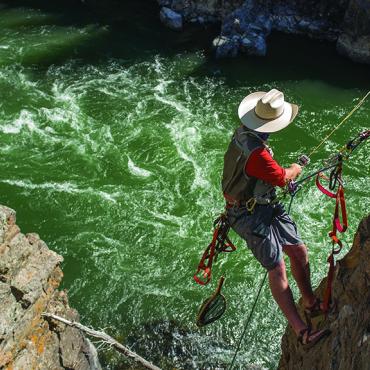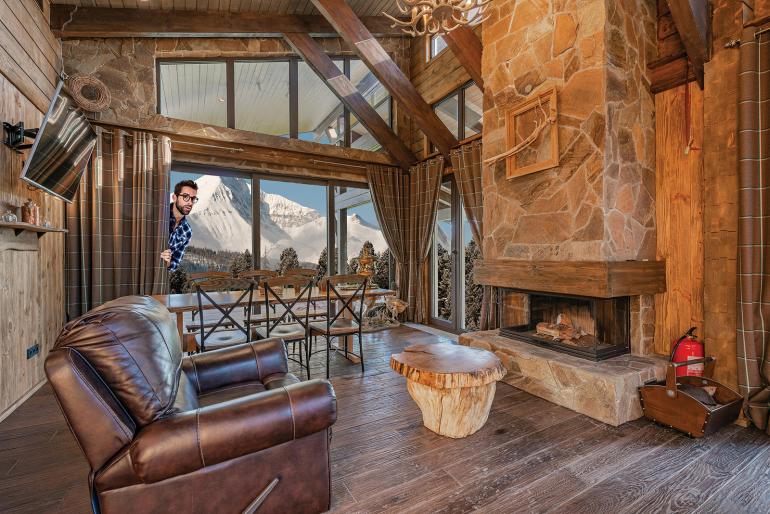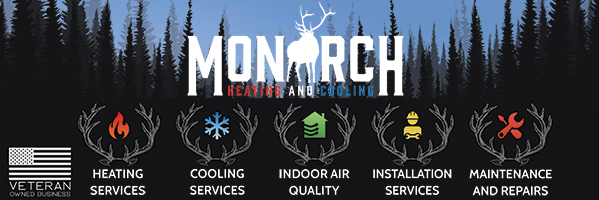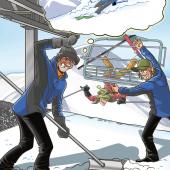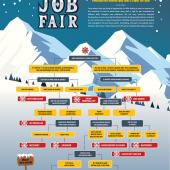Power Squat
A new spin on an old practice.
It’s a calm winter night in Big Sky. With a new moon, it’s nearly pitch black, and a soft snowfall quietly blankets the mountainside McMansions. For the most part, they’re dark, the occupants in other parts of the world—New York City, Switzerland, the Cayman Islands, white-collar prisons. Dark, that is, except for one room in a particularly large “cabin,” as the owners call it. In a distant corner of the sprawling ski cliché—er, chalet—a single light is on, flickering, as a figure shuffles back and forth, head ducked to avoid silhouetting in the window.
Inside, Tuck DeWey is going about his nightly affairs, cooking dinner, reading a few pages of an Edward Abbey book, and getting his ski gear in order for the powder day ahead. He moves cautiously, like a deer during hunting season: taking a few steps, stopping, head cocked. He’s listening for other people in the house—the “legal owners,” one might say. But soon, DeWey is set to become a legal owner himself. After occupying the room unbeknownst to the transient owners for nigh on five years now, DeWey is on the verge of acquiring legal title to his portion of the house, per the archaic—but still active—American tenet of squatter’s rights.
“Montana law does allow for squatting, under certain circumstances,” explains Mayor, a local lawyer. “The more I thought about it, the more sense it made—eventually, I moved my own family into the guest-bedroom suite of a big home up Triple Tree.”
The principle is simple: find an empty room in a mansion, occupy it for long enough, and eventually it becomes your own. Easier said than done, though, according to DeWey. “The real challenge is staying hidden when Tom Brady brings his family for a ski trip every December,” he says. “I have to sneak around between rooms, hide in closets, and cook on my JetBoil at night while they’re asleep.” Challenging, indeed, but better than paying $1,200 per month to share a dumpy Bozeman house with four other stoner ski bums, all dirtier than caged monkeys at the Kathmandu zoo.
When DeWey first moved to Bozeman in 2016, he worked as a bartender and removed climbing holds from the walls of vacated residences in an apartment complex, in exchange for reduced rent. But he was quickly worn thin by the transient and flatulent nature of the other residents. Plus, there wasn’t anywhere for him to store his skis, kayaks, mountain bikes, and complete collection of Jon Krakauer books.
To make things a little cozier, Mayor modified the family portraits, using a glue stick to replace the faces with cutouts of his own wife and kids.
One night, after holding his breath while watching Planet Earth in the community room, he had a revelation: “Those little pocket mice, poaching the dens of kangaroo rats… David Attenborough made it sound so, well, sensible. I thought, those Big Sky billionaires are rats, too, and I’m just a little ol’ mouse.” Within a week, he’d slipped into Brady’s mansion, posing as a smart-ceiling-mirror installer, and set up shop.
To cover his tracks, DeWey connected with a local pro-bono lawyer, Juan Mayor, who couldn’t find any loopholes in the plan. “Montana law does allow for squatting, under certain circumstances,” he explains. “The more I thought about it, the more sense it made—eventually, I moved my own family into the guest-bedroom suite of a big home up Triple Tree.” Mayor had biked past the huge house often, thinking it was a shame that its owners were seldom there. “Now,” he says, “I’m glad as hell that they spend all their time in the Hamptons. This is a real upgrade for my kids, who now have their own jacuzzies.” To make things a little cozier, Mayor modified the family portraits, using a glue stick to replace the faces with cutouts of his own wife and kids. “It’s weird,” Mayor says, “seeing my family playing Pictionary with Vladimir Putin and Elon Musk. What’s even weirder is that I don’t have to change them back—the owners don’t even notice.”
Both Mayor and DeWey still have a few months to complete their five-year requirement of continuous occupancy, but at this point, the only thing that might stand in the way is another squatter—which has threatened both their plans already. DeWey opted for a Home Alone–style booby trap, complete with a coiled rattlesnake at the bottom of the spiral staircase. “I was here first,” he says. “A man’s gotta defend what’s going to eventually be rightfully his.” Mayor, given his profession, goes about things more diplomatically, offering an agreement to share the title—but also the subsequent property-tax burden. “That sends the interlopers packing,” he says, adding with a scowl, “Squatters are so damn cheap!”
If we could get squatters in just one quarter of the empty houses around here, it would be the end of our overinflated rental market.
Meanwhile, the Bozeman City Commission is quietly contemplating a Squatter’s Initiative, as a way to solve both the housing crisis and the urban-camping problem in one fell swoop. “After years of meetings, surveys, department-wide yoga classes, and Magic 8-Ball sessions, we may have found the perfect solution,” says mayor Carrie Tonningham. “If we could get squatters in just one quarter of the empty houses around here, it would be the end of all the incessant bitching—I mean, the end of our overinflated rental market.”
In terms of the day-to-day, though, it’s not always the easiest lifestyle for a mansion-squatter. Last year, DeWey was discovered by one of Brady’s kids and had to make a deal: he’d bootleg alcohol for the youngster in exchange for the boy not ratting him out. So far, it’s worked well, but the kid has expensive tastes, preferring the likes of Don Julio and Johnnie Walker Blue. “I end up spending all my tip money on booze for that little shit,” says DeWey. “But I just have to remind myself that this is really an investment in my future. Once I own that room, I can stop sneaking around. And without the alcohol expense, I can probably afford a nice entertainment system, maybe even a Big Sky lift ticket.”
Relegated to the shadows, these intrepid individuals are icons of American individualism and entrepreneurship—as much so, if not more than, the multi-millionaire tycoons whose houses they occupy.
As DeWey and Mayor approach the final furlong, they’re scheming a reality show called “Rooms of the Rich,” where they parade their purloined living quarters on Peacock. “The story will be all about the journey of room-ownership,” says DeWey. “From scrubbing toilets and donating plasma to a lofted, timber-framed bedroom suite designed by a pompous architect? A real rags-to-riches tale, the classic American dream.”
For now, though, it’s a life of secrecy for the mansion squatters. Relegated to the shadows, these intrepid individuals are icons of American individualism and entrepreneurship—as much so, if not more than, the multi-millionaire tycoons whose houses they occupy. “It’s a really special thing to be a part of,” concludes Mayor. “I just wish these people left more shit in the fridge than freezer-burned Hot Pockets and expired Whole Foods mayo.”
To learn more, visit MontanaMansionSquatters.org.


